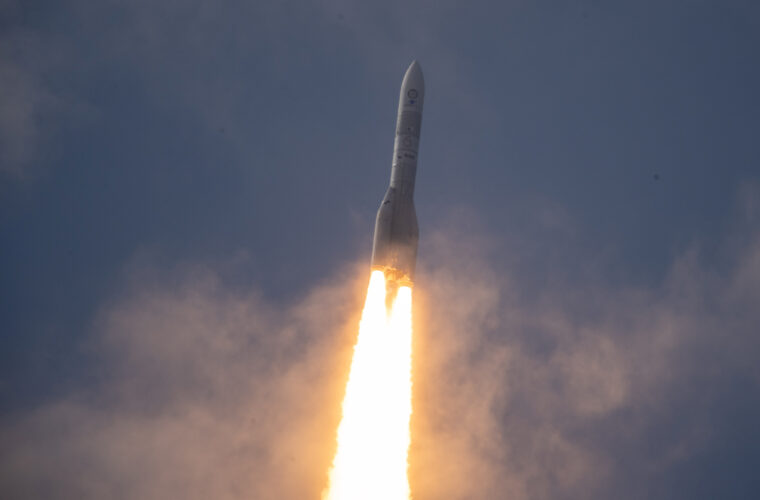By Tim Hepher and Joey Roulette
PARIS (Reuters) – Europe’s Ariane 6 rocket was set to blast off for the first time on Tuesday, ending a year-long hiatus in the continent’s autonomous access to space after a last-minute data glitch.
Pictures released by the European Space Agency showed the 56-metre rocket sitting on its launchpad in French Guiana, where officials described the latest weather status as “green”.
“It looks very good. We have moderate risk of thunderstorms, but it’s getting better going into the (launch) window. So weather should not be a problem today,” Toni Tolker-Nielsen, ESA’s acting director of space transportation, told Reuters from the control room at Europe’s equatorial space port.
The rocket was officially scheduled to lift off during a four-hour launch window starting at 3:00 p.m. (1800 GMT). The space agency said routine checks had shown a “small issue” in a data acquisition system, so the first hour of the launch window was lost and the earliest lift-off would be at 1900 GMT.
The rocket’s nearly three-hour inaugural mission will not be a commercial flight but will carry a handful of satellites and experiments from European agencies, companies and universities.
Final preparations were being carried out before handing over to computers around eight minutes before launch.
“We are readying everything so that we can push that button and start the automatic sequence, which will lead to the lift-off,” Tolker-Nielsen said.
Ariane 6 was developed at an estimated cost of 4 billion euros by ArianeGroup, co-owned by Airbus and Safran. But its arrival, originally due in 2020, has been repeatedly delayed.
Since the agency retired its workhorse Ariane 5 rocket more than a year ago, Europe has had no independent means of sending its satellites into space, while war in Ukraine has cut Western ties to Russian Soyuz rockets and Italy’s Vega C is grounded.
A new generation of small European commercial launchers remains in early development mode.
GROWING COMPETITION
“Ariane 6 is fundamental for Europe’s space ambition,” Tolker-Nielsen said. “It is about sovereign access to space for institutional and governmental missions … and this need has been even more emphasized in view of the geopolitical situation.”
Europe’s temporary isolation in an increasingly global space-launch market was exposed last year when European agencies were forced to switch some payloads to the Falcon 9 rockets of SpaceX in the United States.
Ariane 6 owes its existence to a decision by ESA’s 22 nations in 2014 to develop a family of rockets in the face of fierce competition from Elon Musk’s private space venture.
The United States and dozens of other countries have come to rely heavily on Falcon 9 for reaching orbit as everyday life on Earth becomes increasingly reliant on satellite links and data.

ESA nations have launched an initiative to boost a growing number of small-launcher projects that could pave the way for a future private competitor to SpaceX and Ariane 6 itself.
“Ariane 6 is not quite there yet in terms of competitiveness, but they want to get there,” said Ian Annett, former deputy CEO of the UK Space Agency.
If all goes well with its debut, Ariane 6 has about 30 customer missions to launch over the next several years.
That includes 18 launches for Amazon’s Kuiper internet constellation of thousands of satellites, one of a few planned rivals to SpaceX’s Starlink.
ESA has set itself an initial window for further launch attempts until July 31 if Tuesday’s debut has to be postponed.

